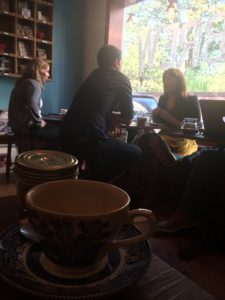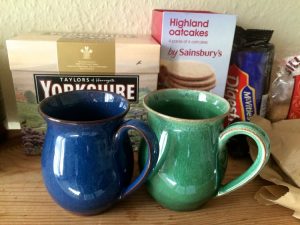Advent & Election Day
Space is still filled with the noise of destruction and annihilation, the shouts of self-assurance and arrogance, the weeping of despair and helplessness. But round about the horizon the eternal realities stand silent in their age-old longing. There shines on them already the first mild light of the radiant fulfillment to come. From afar sound the first notes as of pipes and voices, not yet discernable as a song or melody. It is all far off still, and only just announced and foretold. But it is happening, today.
-Alfred Delp
The dawn after the last election found me in much the same place it finds me today.
Curled on the couch in the fragile blue light of a too-early morning, clutching a cup of tea (truly people, it helps). On neither occasion could I sleep. On both occasions, my impulse was to angst. Four years ago, however, my impulse was also eventually to write the post below because in the course of a morning's Advent devotion, I found a centred place of peace. However fraught and deeply anguished the current election, I find that the conclusions I reached then just don't change. There's still a reality beyond the touch of any worldly power and that's where I have to root today. I'm off to read some Advent poetry (in Haphazard by Starlight).
May you find some peace, my friends, as you rise to to meet the new day and all the changes it brings...
November 8, 2012
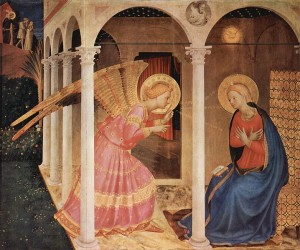 The morning after election night came early for me. I sat in the blue dawn darkness on my couch with a cup of strong tea. I needed it after the buzz of the night. My own thoughts and the voices of countless newscasters and friends spun and blazed in my mind, forbidding sleep or peace of thought. The angst and turmoil expressed by so many the night before troubled me as I sat sipping my tea. My open laptop and a slim book sat with me and I turned to them, hoping for insight in sorting out my thoughts.
The morning after election night came early for me. I sat in the blue dawn darkness on my couch with a cup of strong tea. I needed it after the buzz of the night. My own thoughts and the voices of countless newscasters and friends spun and blazed in my mind, forbidding sleep or peace of thought. The angst and turmoil expressed by so many the night before troubled me as I sat sipping my tea. My open laptop and a slim book sat with me and I turned to them, hoping for insight in sorting out my thoughts.
The computer came first, because, well, it is immediate and blinking and tends to snare my eye before I can resist. I found the online conversation from the night before unabated. Every few seconds another quote or opinion, another post of joy (with numerous exclamation points and capital letters) or deep lament (with grim predictions) at the turn of the evening’s events flashed onto my screen. I scrolled through them until the fury of hope and confusion, fear and faith screamed so loudly in my brain that I felt my very vision was clouded. I shut the computer and when I could see straight, turned to my book instead.
I expected to be calmed, for my reading was a collection of Advent reflections. Odd, and a bit early in the season, I know. But my past year has been one of such constant noise and hurry that I am desperate these days for something to quiet my heart. Advent is about the coming of Christ into the world, about creating space for him – something I deeply need. I was ready to escape into the broad, white northland of contemplative thought. But escape never came. For the Christmas story and Advent thoughts that I found in my book spoke with surprising power to the concerns of after-election morning. Further, as worry released its grip on my heart, an iron conviction took its place.
I realized that election season and Advent are both about the coming of powerful kingdoms. Both have to do with the human cry for the world to be healed and both have to do with rulers who promise to accomplish that desire. The language of holy prophecy and campaign promise are shockingly similar. As I read ancient verses about the grace and healing promised to us through Jesus and his kingdom of heaven, I was struck to realize that the claims of the presidential candidates sound eerily the same. Those two very human leaders have spent a frenzied year convincing us that they are the ones to bring hope and change, peace and prosperity, health, equality, and freedom. Messianic claims, those.
Do we, I wonder, almost believe them? Of course we all know that only God really saves, but maybe we get a little weary at the fallenness of the world and we hunger to see the kingdom of God come with more distinction. The lines between heaven and earth get blurred when we look at the leader of our choice and think that he “gets” the brand of redemption we believe in. If he is elected, we think, then God’s kingdom can come more swiftly, more fully, more tangibly. The right president, we feel, might usher in a bit of peace on earth.
It’s a natural impulse. We are eager to bring God’s life into this troubled, aching world, and it seems logical that God would want us to support leaders who can do his will on a grand, immediate scale. So when the leader we thought was righteous falls and fades before the triumph of a leader we mistrust, our fear is for something more than just the direction of our country. Conversely, the triumph of our chosen man portends more to us than good government. We mourn or rejoice as if the kingdom of heaven itself was in the balance.
But it never is. That’s the truth I realized as I read about the coming of Christ in my Advent book today. There never has been a single king or kingdom on earth that could stop or slow or even speed the coming of Jesus into this world. Herod certainly couldn’t keep the little King from entering his realm, the pharisees couldn’t keep him silent, and Ceaser himself couldn’t stop people from loving Christ enough to die. All the bluster and sputter of rulers down the ages have never halted the coming of Christ and his kingdom and this is why: the kingdom of God comes, not through human governments, but in human hearts.
The story of Advent and the holy day to which it leads us is the tale, not of overcoming power, but of redemptive love. Jesus brings the rule of his kingdom into the world by entering the wrecked house of the human heart and building it into the palace from which he reigns. The kingdom comes when God’s love so completely rules in our hearts that our actions become his own. This kingdom grows not by the influence of government, or the power of any one person, but by Love spreading from heart to heart so that slowly, the kingdom burns in a hundred, then a thousand, then a million hearts. That’s when the rest of the earth begins notice.
In my book today, I read a contemplation on Mary, the first human heart in which the kingdom of God came. Not an ounce of power or influence attended her, she was young, frail, unimportant. She lived in a tiny village in a forgotten, enemy-occupied land. But her heart was spacious and her spirit ready and when God asked her to bear his love and life into the world, her answer was a joyous, obedient yes. And the King and his kingdom came into this world through Mary. The kingdom came in Joseph when he believed Mary’s wild story and let Love rule his own heart and deeds. It came in the disciples as they laid down their own lives and were ruled and healed by Love. And it comes in us as well when we choose God as our king. The only election we need to worry about is the one in our own hearts, the one where we set Love to rule instead of self.
The Kingdom, the real one, has come. It is coming, unstoppably, inexorably, day by day in and through all of us who love God. The kingdom comes in our loving of neighbor and child, it comes through the beauty, the art and song and story we create from the vision within us. It comes through the life we incarnate into every corner of home and habit, the hope we speak, the true story we tell to the world. Yes, we can pray and hope and vote to put good men and women in power. But their reign will not hinder or halt the kingdom of heaven in any way. For our kingdom is eternal, a blazing love that reigns in our hearts, unswayed by this king, or that political party, or this presidential election.
I put down my book and rose to face my day. I didn’t even need a second cup of tea.
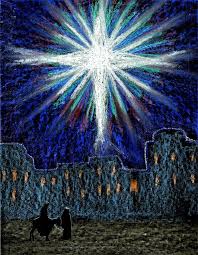
 Autumn reminds me of St. Paul and his paradoxical Gospel. Who else describes God's servants as those who are 'sorrowful yet always rejoicing', 'dying', and yet, 'we live', and is there any better picture of that than a fallen autumn leaf? Death and glory in a golden turn, energy and decay, eternal life in crimson, throbbing veins etched as a final word through the brown fabric of death. Ah, autumn. To me it is a yearly, living picture of Christ's life burning in those who love him, an affirmation that even the dying gloom of the broken world can't hide.
And yet, there is that gloom, that brown curl of death around the gold. This year, the death stands out very strongly to me.
Autumn reminds me of St. Paul and his paradoxical Gospel. Who else describes God's servants as those who are 'sorrowful yet always rejoicing', 'dying', and yet, 'we live', and is there any better picture of that than a fallen autumn leaf? Death and glory in a golden turn, energy and decay, eternal life in crimson, throbbing veins etched as a final word through the brown fabric of death. Ah, autumn. To me it is a yearly, living picture of Christ's life burning in those who love him, an affirmation that even the dying gloom of the broken world can't hide.
And yet, there is that gloom, that brown curl of death around the gold. This year, the death stands out very strongly to me.
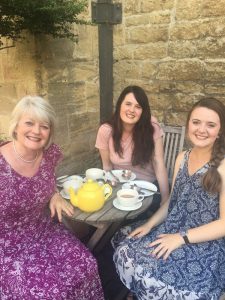
 I think we celebrate what we love, and what we hope. Think about it, Christmas, Easter, birthdays, the 4th of July, all of these holidays (holy days!) are celebrations centered on what we value – the fact that Christ was born, that death will be overcome (something we still hope to see), freedom (and our hope for it to continue). We need to mark these things in order to remember, to reaffirm our hope in all the ‘bad things coming untrue’.
I think we celebrate what we love, and what we hope. Think about it, Christmas, Easter, birthdays, the 4th of July, all of these holidays (holy days!) are celebrations centered on what we value – the fact that Christ was born, that death will be overcome (something we still hope to see), freedom (and our hope for it to continue). We need to mark these things in order to remember, to reaffirm our hope in all the ‘bad things coming untrue’.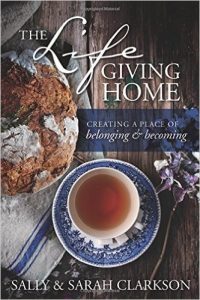
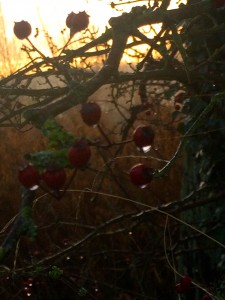
 One of the dearest parts of my wedding were gifts like these. My own sweet mom gave me (among countless other gifts of hand and heart) her mother's set of blue Lenox china, the one with the fruit baskets that so fascinated me as a child, and a silver teapot with a dark wooden handle that sat on the sideboard of my father's mother throughout my childhood. These gifts of heritage and memory, linking my new home to my childhood memories of Thanksgiving tables and teatimes with Mama, are a tangible history, living gifts that are more than mere things. Every time I reach for that teapot or pour something hot into a Lenox cup, I can hear my mom's voice saying: 'drink the cup the Lord has given you, pour out your life for others...' Her gifts, like Phyllis' basket, will shape the story my home will tell.
One of the dearest parts of my wedding were gifts like these. My own sweet mom gave me (among countless other gifts of hand and heart) her mother's set of blue Lenox china, the one with the fruit baskets that so fascinated me as a child, and a silver teapot with a dark wooden handle that sat on the sideboard of my father's mother throughout my childhood. These gifts of heritage and memory, linking my new home to my childhood memories of Thanksgiving tables and teatimes with Mama, are a tangible history, living gifts that are more than mere things. Every time I reach for that teapot or pour something hot into a Lenox cup, I can hear my mom's voice saying: 'drink the cup the Lord has given you, pour out your life for others...' Her gifts, like Phyllis' basket, will shape the story my home will tell.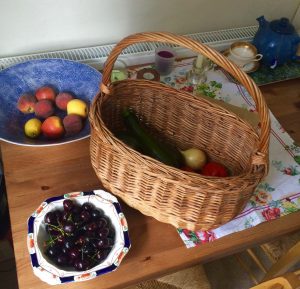 Let there be light. Let there be love. Let there be music. Those are the concluding lines to the chorus of Andrew's lovely song, and they are a perfect soundtrack to what we are called to do in creating home. If there is a redemptive, freeing power in naming what is dark or hard in our heritage, there's wildly creative one when we sit down in the space of life, spirit, and home to bring form, color, growth, and beauty.
Let there be light. Let there be love. Let there be music. Those are the concluding lines to the chorus of Andrew's lovely song, and they are a perfect soundtrack to what we are called to do in creating home. If there is a redemptive, freeing power in naming what is dark or hard in our heritage, there's wildly creative one when we sit down in the space of life, spirit, and home to bring form, color, growth, and beauty.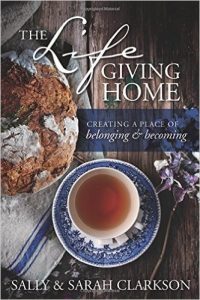
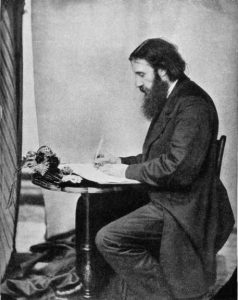 throughout his (very sorrow-filled) life. God's role, and presence in our suffering is something I'm very keen to study and I love MacDonald because he so powerfully presents God as Father:
throughout his (very sorrow-filled) life. God's role, and presence in our suffering is something I'm very keen to study and I love MacDonald because he so powerfully presents God as Father: